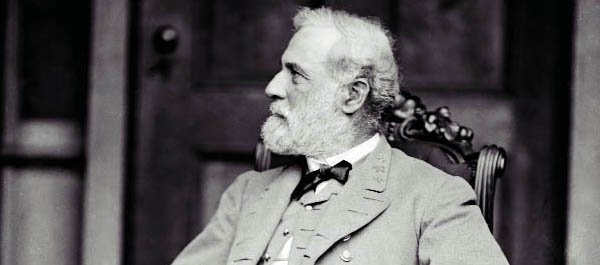By blindly relying on poor intelligence and saying far too little to his generals, Lee may have sealed the Rebels’ fate.
The afternoon of July 3, 1863, near Gettysburg, Pennsylvania, promised to be hot. A town resident with a scientific bent would record a high temperature of 87 degrees for this day. At his headquarters just west of town, alongside the Chambersburg Pike, Gen. Robert E. Lee was feeling a heat that had little to do with the sun. Everywhere he looked men, animals, and weapons were moving with a sense of purpose instilled by orders he had given just a short time before. A climax to two days of battle was coming, announced by an action sure to be bloody, and certain, he fervently hoped, to be decisive.
To anyone passing by the modest headquarters tent, the 56-year-old commander of the Confederacy’s finest army appeared, as one soldier recalled, “calm and serene.” There is no reason to believe otherwise. “I think and work with all my power to bring the troops to the right place at the right time; then I have done my duty,” Lee said. “As soon as I order them into battle, I leave my army in the hands of God.”
Over the course of the morning, an unnatural peacefulness had spread across the battlefield save for the occasional pop of a distant rifle firing. Then, at seven minutes past one o’clock, Lee heard a signal cannon shot followed, after a short pause, by a second. No one needed to tell him what it meant. The attack that was to decide the battle, and perhaps the war, was beginning.
A great deal would be written about the events at Gettysburg. Lee himself would submit three different reports explaining the critical decisions he made this day and the two days immediately before it. In them he would imply that his principal lieutenants had come up short, and would even wonder if he had asked his men to do too much.
But missing from his analysis was any recognition that he based his plans on a great deal of field intelligence that he might have guessed was flat-out wrong, that, given the circumstances (especially the absence of his favored cavalry chief, which forced Lee to rely on information from less trustworthy substitutes) he should at the very least have treated with far more caution.
Nor does it indicate that General Lee ever asked himself if he could have done more to ensure that those empowered with executing his orders fully understood his intentions. To put it bluntly, it is clear these 146 years after his reflections that Lee—even though he had just completely reorganized his army, with new officers serving at all levels—failed to see that his battle instructions were fully communicated to all of his commanders. It wasn’t the first time, nor would it be the last, that a battle turned on a misapprehension or miscommunication. Gettysburg had more than its share of both, however, due in no small part to Lee’s hands-off management style—and his determination to make this battle the one that changed the war.
Lee had been on the road to Gettysburg from the start of the conflict. From the moment he was placed in command of the Army of Northern Virginia, he believed that the Confederacy’s survival depended on expanding the fighting deep into Union territory. Even as he struggled to hold back a massive Federal army under Maj. Gen. George B. McClellan that was threatening Richmond in 1862, he tried to assemble a sufficiently strong force for Lt. Gen. Thomas J. “Stonewall” Jackson to invade Pennsylvania from the Shenandoah Valley. It wasn’t to be; the resources of the Confederacy were spread too thin. But the impulse became an idée fixe in Lee’s strategic thinking.
[continued on next page]





